
The Free Press

The great Kat Rosenfield has been appearing in our pages since Common Sense days, but you might have noticed her name popping up more frequently in recent weeks. That’s because she’s joined The Free Press as our columnist on all things culture. And just in time. America is in crisis, and we’re not just talking about the election. We’re talking about the state of our culture.
We’ve long been interested in how identitarian politics has transformed businesses like publishing and Hollywood. But there are so many other questions. Like when was the last time you read an unforgettable new novel? When was the last time you saw a phenomenal movie? (For that matter, when was the last time you went to the movie theater?)
There’s so much “content.” But so little of it is any good. Meantime, there’s a strange gap between what’s popular and what’s praised. The most beloved shows and stand-ups are often the ones most viciously panned by critics and vice versa.
Below, Kat argues that culture got bland because criticism got dumb. As our Free Press culture critic, Kat won’t celebrate anything just because it has the right politics. And she’ll never, ever tell you what to like. I’m so excited to have Kat on board, and to present her always sharp, usually funny, and never preachy take on all things culture. —BW
Like a lot of ’90s kids, I had strict rules growing up about what I was allowed to watch on TV—but with a twist. Unlike my friends, whose viewing restrictions were based on things like sex or violence, my mom had a single, esoteric standard: I was not allowed to watch anything “stupid.”
At first I found this bewildering, mostly because the definition of “stupid” seemed impossible to pin down. The thrills, chills, and winking conspiracy theories of The X-Files were totally acceptable; the soapy teen drama of shows like Beverly Hills, 90210, a hard no.
Eventually, though, I began to recognize what the shows my mom approved of had in common: snappy writing, weird humor, complex characters who defied the binary of good and evil. It wasn’t just that the shows themselves were smart. It was that they assumed the audience was too.
What strikes me now is that my mother’s standards weren’t really about stupidity; they were about taste and teaching me to develop it. As an adult, I rarely turn on the TV in search of mindless entertainment—because in the house I grew up in, the point of watching television wasn’t to veg out, but to pay attention, the way you would to anyone who wanted to tell you a story.
It’s no surprise, in hindsight, that I was drawn not just to telling my own stories but writing about other people’s for a living. In 2010, as a young journalist, I became an entertainment reporter at MTV News. Unfortunately, you’ll have to take my word for this: a few weeks ago, the MTV archives were abruptly wiped from existence—and with them, every byline from my early years.
I doubt historians will someday lament the loss of my 2015 magnum opus listicle: “Ten Walking Dead Zombies with Surprising Shapely Butts.” But if the work I produced as a baby entertainment journalist was not crucially important, man, it was fun—and weird, and freewheeling, and alive with the sense that art was meant to speak to and through us all, without shame or apology.
Do you remember what it was like, in those heady golden years? The Marvel Cinematic Universe was still in its audacious early stages. Publishing was riding high on book-to-film franchises like Twilight, The Hunger Games, and of course, Harry Potter. Quentin Tarantino and Christopher Nolan and Alfonso Cuarón were becoming household names. Television was full of prestige offerings, from the drama of Mad Men to the high fantasy of Game of Thrones—shows we gathered in our living rooms to watch in real time, then rushed to social media to discuss as soon as the credits rolled.
Best of all was the way we watched—not with the distance of a sanctimonious overseer, but immersively, obsessively. Did you see that book on a table in the background during the pivotal scene? Did you notice the composition of that shot? Did you read this multi-thousand-word fan theory about who Jon Snow’s parents are, about why Tony Soprano definitely got whacked?
I am amazed, looking back, by the richness not just of the storytelling but of the discourse surrounding it.
In Gillian Flynn’s 2012 novel Gone Girl, a man ponders the nature of his relationship with his sociopathic wife: “What are you thinking? How are you feeling? Who are you? What have we done to each other? What will we do?” I thought about these questions often in the era of Peak TV, and still think about them—as a novelist, a reader, a writer, a critic. I believe my job is to be curious about the answers, even if those answers are monstrous. We are not here to condemn; we are here, to borrow from Joan Didion, to understand what we see and what it means.
Critics used to agree that the purpose of art is to explore what is true, not to model what is proper. But around the time Flynn’s breakout novel was breathing new life into the domestic thriller genre, a new breed of cultural commentator was gestating—one for whom art was understood less as a truth-seeking enterprise than as a vehicle for moral instruction.
In the early 2010s, Tumblr gave birth to an accusatory and highly influential blog titled Your Fave Is Problematic, which studiously cataloged the offenses that artists, authors, and celebrities had committed against social justice. A hallmark of YFIP was its utter collapse of the distinction between art and artist: one representative post from 2013, about YA author John Green, lists allegedly offensive comments made by Green next to quotes uttered by his fictional characters, as though they were one and the same.
Years later, in 2021, the author of YFIP revealed herself in the pages of The New York Times, admitting she was an angsty teenager when she started the blog, and had canceled people to feel better about herself. But by then, the notion that cultural criticism should be first and foremost an exercise in taking offense had taken gangrenous root—not just on social media but in the legacy press, propagated by a new generation of young, hungry, underpaid opinion writers who survived by making you hate-click.
The tenets of the new cultural criticism were as follows:
All art was political, and always had been;
Art with the wrong politics caused harm, especially to women and people of color;
And all art must be analyzed through the lens of power, privilege, and progressive pieties.
The whole thing had a frantically performative vibe that bordered on the evangelical—with journalists in the role of the youth pastor palpably desperate to keep you going to church. “It’s fun to think about this stuff,” pleaded one representative essay at the viral trend site Uproxx, begging readers to devote themselves to woke critique with the same enthusiasm with which they once debated the bloodlines of the Targaryen dynasty. “Are you telling me that it’s cool to argue for hours about who Azor Ahai is, but a ten-minute discussion of race, gender, and shifting sensibilities before rewatching an ’80s classic is somehow wasted time? Get out of here.”
It was inevitable that a rift would emerge between the enlightened critics and the unwashed masses who, as it turned out, would rather not undergo mandatory DEI training every time they turn on the television. The one-two punches of #MeToo followed by BLM only widened it.
Today, there’s often a hilarious mismatch between how normie audiences receive a film versus how it’s reviewed by critics, one most clearly visible on the site Rotten Tomatoes. “Problematic” comedians like Dave Chappelle are denounced by the culturati while ordinary people laugh their asses off. Chappelle’s 2021 Netflix special The Closer, for instance, gets an audience rating of 95 percent, with one of the top reviews calling it an “Absolute Masterpiece!!” The critics, meanwhile, rate it a dismal 36 percent, led by a review titled “Why Netflix Deserves Some of the Heat for Dave Chapelle’s Transphobic Comments.”
Unfortunately, like their Tumblr predecessor, the media’s offense-takers enjoy outsize influence—so Hollywood, always a liberal bastion, has increasingly come to see itself as a moral authority. The result is observable, as the complex and provocative stories of the peak TV era have given way to something far more pious, dutiful, dull, and shrill.
Ted Lasso, the infectiously cheerful comedy that debuted as a smash hit in 2020, last year devolved into a dour final season of very special episodes pushing progressive narratives about everything from immigration and LGBT awareness to proper digital hygiene when it comes to your ex’s nudes. It’s seen a 15 percent drop in its audience rating on Rotten Tomatoes.
After You, a dishy drama about a serial-killing Casanova, moved from Lifetime to Netflix in 2019, the show immediately started trying to compensate for its fundamental political incorrectness. Characters start acknowledging their privilege. An anti-vaxxer is murdered, and it’s presented as a net positive. A black love interest lectures the lead on “missing white woman syndrome.” (On IMDb, a slew of users cite season four as the reason they stopped watching the show.)
What is lost in this sea of feel-bad content isn’t just a sense of fun, but of taste. These “non-problematic” shows are not just irritating, they’re bland and forgettable—except in those rare moments when they pass through the looking glass into the world of self-parody, as in the 2018 NBC drama New Amsterdam when a doctor delivers this somber diagnosis without even a hint of irony: “I think your son’s tumor was caused by racism.”
Which brings us to our current moment of cultural desolation: another Garfield movie; another Mario movie; a sixth—or is it seventh?—film featuring those googly-eyed yellow things called minions; copies of copies of things we’ve seen before, everything studiously inoffensive. The most anticipated show of the summer is a Game of Thrones spin-off, whose chief innovation has been to replace the original’s notoriously debauched sex scenes with either CGI dragons or unmedicated medieval childbirth.
But even in this artless wasteland, we’re still watching; we still want to watch. Inside Out 2 has netted upward of $1.25 billion at the box office despite a rare, near-unanimous consensus among critics and normies alike that the film isn’t anywhere near as fun as the original. Hit Man, a movie so tonally and narratively confused that not even the charming Glen Powell can salvage it, has topped the charts in Netflix’s most-watched category for weeks. The best thing that can be said about it is that its sensibilities feel rooted in the era when Hollywood was less interested in social justice than in blowing things up. The film isn’t good, but it’s refreshingly apolitical.
But don’t we want more? To laugh, to cry, to be thrilled, to be moved? To lose ourselves in a story we haven’t heard before, and to decide for ourselves what it means? There are still good stories out there, in the sea of content: the historical drama of Shōgun, the dark amusements of Saltburn, the savage satire of American Fiction. I was entertained by Barbie and elated by Oppenheimer. Society of the Snow glued me to my television for two and a half hours on a winter afternoon; Ricky Stanicky convinced me that any comedy starring John Cena should instantly go on my watchlist.
Despite the strange takeover of my chosen field by tasteless scolds, I still believe there’s nothing better than a story that grabs you and won’t let go. So from now on, you’ll find me writing about all things culture regularly here at The Free Press. I may not have another zombie butt manifesto in me, but I promise I’ll never stop asking the questions that animate the stories we tell and the way we talk about them. Who are we? What have we done to each other? What will we do?
And most importantly, I want to ask you, the readers: What are you thinking? What are you watching? Tell me; I’m dying to know.
Kat Rosenfield is a brand-new columnist at The Free Press. Read her previous work for us here and follow her on X @katrosenfield.
Have you watched, read, or listened to something you’d like to recommend to Kat and other Free Pressers? Write to us: letters@thefp.com.
And if you want to follow Kat’s thoughts on the culture, subscribe today:


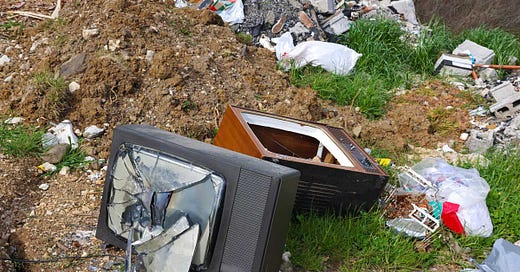






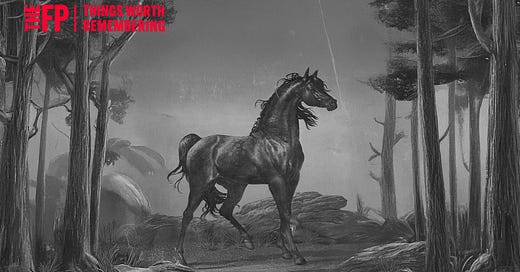
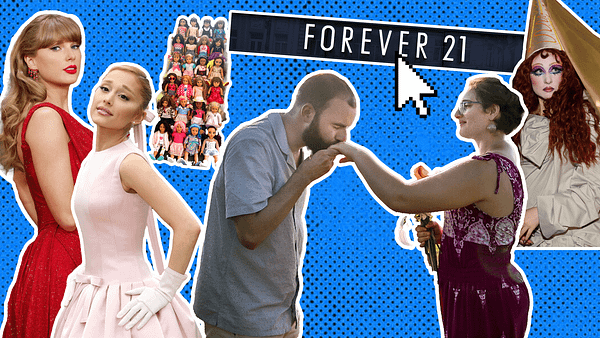


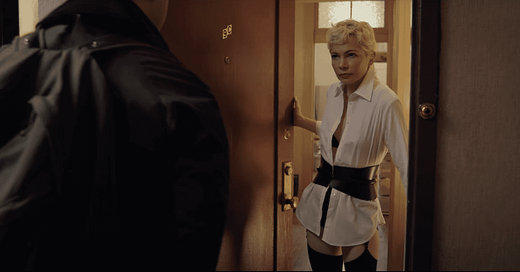

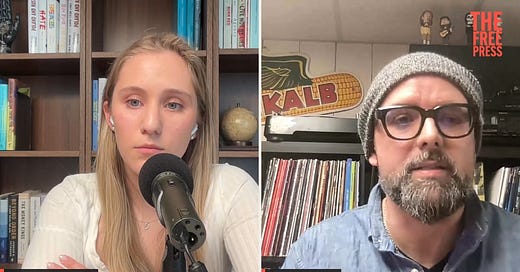

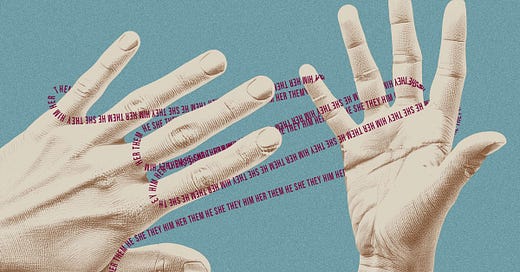
I have loved the British series "Call the Midwife," even though it definitely had some left (not woke) messages. I loved the focus on birth and new life, the wonderful array of characters, the complexity of the plots. I'm also now enjoying another British series, "All Creatures Great and Small," which is sort of like Call the Midwife, but for cows and other animals. So far, nothing is woke, and the accents enchant me.
Thanks for an excellent summation of what now passes for “culture.” It’s not just in tv and movies that the woke ideology is being forced upon us. Classic operas are destroyed by changing plot lines to fit woke ideas; orchestras are required to play music by under- recognized and under-represented composers. Audiences are voting with their feet- right out the door.
On the other hand, i saw Anatomy of a Fall at the movie theater, and i was transfixed. Compelling acting, great soundtrack, and a suspenseful building of plot.